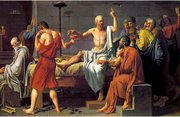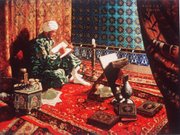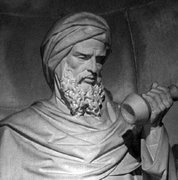Remembering al-Hallaj
By Dr Muzaffar Iqbal
On the evening of March 26, 922, a large crowd gathered on the banks of the Tigris, just in front of Bab Khurasan; they had come to witness the public hanging of an extraordinary man who had lived in Baghdad for almost seventeen years now. His death sentence, passed by the public prosecutor in the presence of many prominent members of the judiciary, listed a number of charges against the man who was, at that time, being kept in the police station across the river. Whatever the nature of charges against him, the condemned man was not interested in defending himself. In a public outburst of unusual nature, he had, in fact, declared his killing lawful, that it was almost a religious duty for his brethren in faith. This bold and daring invitation to kill him was, however, not merely for a simple death, but for a violent one: "Kill me, O my dear friends, for me living is death, and death life. Kill me, and burn me, and spread my crumbling bones…"
Ironically, the reasons for which he was being hanged by a thoroughly corrupt government had nothing to do with his own call; he was being killed for political reasons. During the last few years, his fervent sermons had stirred up a revolution in Baghdad that sought to purify the decaying and corrupt milieu of the Abbasid Empire. In fact, Caliph al-Muqtadir had been deposed by an unprecedented coup in December 908, but the next day the new Caliph was removed by the powerful generals. Thus the young al-Muqtadir regained caliphate though the real control of power remained in the hands of his mother and more so in the hands of military generals who then thrived on corruption and power politics of the worst kind.
For al-Hallaj, the reasons for his hanging had no importance. He had reached a state in his mystical journey where reasons had no meaning; only his unflinching love for God mattered. Thus when he was hanged that night before an enormous crowd that had gathered to witness hanging, he was smiling, eagerly awaiting the meeting with his Lord. Among those who had gathered around the place of hanging were many celebrated Sufis of Baghdad, including his friend Shibli, who threw a red rose toward al-Hallaj in a highly symbolic act that has drawn attention of countless scholars over the centuries.
Over the last 1085 years, Mansur al-Hallaj has become one of the most celebrated legends of Islamic mysticism and poetry. Generations of Sufis, poets, and scholars have written about him, and he continues to draw attention both in the East and the West. He has left behind a Divan, a short treatise of eleven chapters, Kitab al-Tawasin, which contains one of the best eulogies of the Prophet (PBUH) ever composed in any language, and some three hundred and fifty isolated sayings. It is, however, not the corpus of his works that has made this extraordinary man a living legend, it is the scant record of his mystical journey and his public testimony to it that has made him what he is.
He was not a recluse, but a man of action who has left a deep mark on Islamic thought. In addition to the function he serves for those on the mystical journey, he is also a heroic figure for those who wish to bring about a change in the public domain. He has provided guidance and inspiration to such varied men and women as Iqbal, Goethe, Dante, and Louis Massignon. Massignon, in fact, spent his entire life collecting, annotating, and editing his works.
To al-Hallaj is attributed the metaphor of the moth and the flame. The moth flutters around the flame, for it has received news of its light. But once there, it is not content with mere news: it wants to taste Reality. Thus revolving in ever smaller circles, it finally throws itself into the flame, thereby becoming one with it; consumed by it, it regains another life. This powerful metaphor has appeared time and again in poetry of various languages.
Perhaps no one stood by the banks of Tigris on March 26, 2007 to remember al-Hallaj, but millions of men and women around the world quietly celebrated the memory of this mystic of Islam, who had traveled far and wide during his life, leaving behind memoirs of his transit in places as far apart as Makkah and Ughir. Among all the mystics of Islam, it is al-Hallaj who has been granted the function of opening doors to hearts for those who are consumed by Divine love for his was a passionate affair, lived, and relived in countless hearts as they journey toward God.
For those who are only concerned with the outward, his passionate calling to a life devoted to God and only God may seem blameworthy, but for those who are in the midst of an all consuming love for God, his mystical journey remains irresistible. At the heart of this mystical journey is an abandonment of the self for the sake of the friend:
O All of my all, the all of all things, equivocal enigma
It is the all of Your all that I obscure in wanting to express You
Let my heart be Your ransom! O my hearing, O my sight!
Why do You keep me so long at such a distance?
Diambil dari Koran The News Pakistan
By Dr Muzaffar Iqbal
On the evening of March 26, 922, a large crowd gathered on the banks of the Tigris, just in front of Bab Khurasan; they had come to witness the public hanging of an extraordinary man who had lived in Baghdad for almost seventeen years now. His death sentence, passed by the public prosecutor in the presence of many prominent members of the judiciary, listed a number of charges against the man who was, at that time, being kept in the police station across the river. Whatever the nature of charges against him, the condemned man was not interested in defending himself. In a public outburst of unusual nature, he had, in fact, declared his killing lawful, that it was almost a religious duty for his brethren in faith. This bold and daring invitation to kill him was, however, not merely for a simple death, but for a violent one: "Kill me, O my dear friends, for me living is death, and death life. Kill me, and burn me, and spread my crumbling bones…"
Ironically, the reasons for which he was being hanged by a thoroughly corrupt government had nothing to do with his own call; he was being killed for political reasons. During the last few years, his fervent sermons had stirred up a revolution in Baghdad that sought to purify the decaying and corrupt milieu of the Abbasid Empire. In fact, Caliph al-Muqtadir had been deposed by an unprecedented coup in December 908, but the next day the new Caliph was removed by the powerful generals. Thus the young al-Muqtadir regained caliphate though the real control of power remained in the hands of his mother and more so in the hands of military generals who then thrived on corruption and power politics of the worst kind.
For al-Hallaj, the reasons for his hanging had no importance. He had reached a state in his mystical journey where reasons had no meaning; only his unflinching love for God mattered. Thus when he was hanged that night before an enormous crowd that had gathered to witness hanging, he was smiling, eagerly awaiting the meeting with his Lord. Among those who had gathered around the place of hanging were many celebrated Sufis of Baghdad, including his friend Shibli, who threw a red rose toward al-Hallaj in a highly symbolic act that has drawn attention of countless scholars over the centuries.
Over the last 1085 years, Mansur al-Hallaj has become one of the most celebrated legends of Islamic mysticism and poetry. Generations of Sufis, poets, and scholars have written about him, and he continues to draw attention both in the East and the West. He has left behind a Divan, a short treatise of eleven chapters, Kitab al-Tawasin, which contains one of the best eulogies of the Prophet (PBUH) ever composed in any language, and some three hundred and fifty isolated sayings. It is, however, not the corpus of his works that has made this extraordinary man a living legend, it is the scant record of his mystical journey and his public testimony to it that has made him what he is.
He was not a recluse, but a man of action who has left a deep mark on Islamic thought. In addition to the function he serves for those on the mystical journey, he is also a heroic figure for those who wish to bring about a change in the public domain. He has provided guidance and inspiration to such varied men and women as Iqbal, Goethe, Dante, and Louis Massignon. Massignon, in fact, spent his entire life collecting, annotating, and editing his works.
To al-Hallaj is attributed the metaphor of the moth and the flame. The moth flutters around the flame, for it has received news of its light. But once there, it is not content with mere news: it wants to taste Reality. Thus revolving in ever smaller circles, it finally throws itself into the flame, thereby becoming one with it; consumed by it, it regains another life. This powerful metaphor has appeared time and again in poetry of various languages.
Perhaps no one stood by the banks of Tigris on March 26, 2007 to remember al-Hallaj, but millions of men and women around the world quietly celebrated the memory of this mystic of Islam, who had traveled far and wide during his life, leaving behind memoirs of his transit in places as far apart as Makkah and Ughir. Among all the mystics of Islam, it is al-Hallaj who has been granted the function of opening doors to hearts for those who are consumed by Divine love for his was a passionate affair, lived, and relived in countless hearts as they journey toward God.
For those who are only concerned with the outward, his passionate calling to a life devoted to God and only God may seem blameworthy, but for those who are in the midst of an all consuming love for God, his mystical journey remains irresistible. At the heart of this mystical journey is an abandonment of the self for the sake of the friend:
O All of my all, the all of all things, equivocal enigma
It is the all of Your all that I obscure in wanting to express You
Let my heart be Your ransom! O my hearing, O my sight!
Why do You keep me so long at such a distance?
Diambil dari Koran The News Pakistan




No comments:
Post a Comment